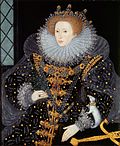Thirty-Nine Articles
The Thirty-Nine Articles are the historic statements of Anglican beliefs. The Articles were not meant to be a complete statement of the Christian faith. They are a statement of the position of the Church of England against the Roman Catholic Church and against Protestants.
History
The articles were made in 1563, under the direction of Archbishop Matthew Parker, during the reign of Queen Elizabeth I. They are based on the Forty-Two Articles written under the direction of Thomas Cranmer in 1552 and passed under Edward VI of England in 1553. They are printed in the Book of Common Prayer and other Anglican prayer books. Priests, deacons, and bishops of the Church of England have to take an oath that what is said in the Articles is "agreeable to the Word of God." Other Anglican churches do not make such a requirement.
The Thirty-Nine Articles were needed because at that time in English history it was not possible to find an agreement about Protestantism. Rather than have the church become divided, they needed a way to list the essentials of what the Church of England believed. John Henry Newman (one of the leading Tractarians in the mid 19th century), before he converted to Roman Catholicism, tried to show that the Articles could be seen in a way less hostile to Catholic belief.
Acceptance of the Articles
Outside the Church of England, Anglican opinions of the Thirty-Nine Articles vary. The Episcopal Church in the United States of America sees them as an historical document but does not make its members follow them. Anglican priest John Wesley changed the Thirty-Nine Articles for use by American Methodists in the 18th century. These new Articles of Religion are still the official United Methodist Church doctrine.
Thirty-Nine Articles Media
Thomas Cranmer headed the committee that authored the Bishop's Book.
Elizabeth I, in whose reign the Thirty-nine Articles were passed
Other websites
| Wikisource has original writing related to this article: |
- Articles of Religion
- Anglican Communion resources relating to the Book of Common Prayer, including the articles of religion Archived 2013-12-05 at the Wayback Machine
- facsimile of a 1762 printing Archived 2006-11-09 at the Wayback Machine from the above site
- The revised 1801 version adopted by the US Episcopal Church



